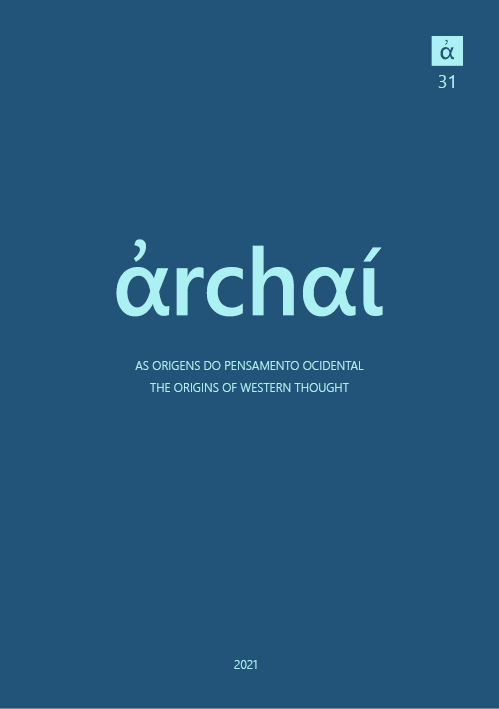Measurement and excess in Ajax: transition from an agonal ethic to an enlightened ethic.
DOI:
https://doi.org/10.14195/1984-249X_31_1Keywords:
measure, excess, enlightened ethics, agonal ethicAbstract
In Sophocles’ Ajax, a recurring conflict between two axiological systems gets thematized: the archaic, in which agonal values and personal excellence predominate, and the enlightened, which corresponds to the demands of already-developed cities (poleis) and their values of equality and communal deliberation. This conflict is developed from a topic typical of the practical ideology of the time: the problem of measure and excess (metron/hybris). The present work will account for the peculiar Sophoclean treatment of this problem through the analysis of the lexicon in different passages of the work. As will be seen, characters as antagonistic as Ajax, Menelaus, and Agamemnon nonetheless concord in word choice when substantiating their decisions regarding how to act in situations of conflict. These words define common concepts typical of the archaic heroic code. On the contrary, other characters such as Tecmesa, the sailors’ choir, Odysseus himself, and Athena take different perspectives that are linked to enlightened demands.
Downloads
References
ADAMS, S. M. (1955). The Ajax of Sophocles. En Phoenix 9, p. 93-110.
ADKINS, A. W. H. (1965). Merit and Responsibility. A Study in Greek Values. Oxford: Oxford University Press.
ALAMILLO A. (2008). Sófocles. Tragedias (Introducción, traducción y notas). Madrid: Gredos.
BIGGS, P. (1966). The Disease Theme in Sophocles’ Ajax, Philoctetes, and Trachiniae. En Classical Philology 61, p. 223-235.
BROWN, E. (1965). Sophocles’ Ajax and Homer’s Hector. En The Classical Journal 61, 3, 118-121.
BOWRA, C. M. (1952). Sophoclean Tragedy. Oxford: Oxford Universiy Press.
BOWRA, C. M. (1971). Periclean Athens. Londres, Wiedenfeld and Nicolson.
CALONGUE RUIZ, J., LLEDÓ ÃÑIGO, E., GARCÃA GUAL, C. (1985). Platón. Diálogos I (Introducción, traducción y notas). Madrid: Gredos.
COHEN, D. (1978). The Imagery of Sophocles: a Study of Ajax’s Suicide. En Greece & Rome 25, 1, p. 24-36.
CRESPO GUEMES, E. (1996). Homero. Ilíada (Introducción, traducción y notas). Madrid: Gredos.
CHANTRAINE, P. (1999). Dictionnaire étymologique de la langue grecque. Histoire des mots. París: Kilcksieck.
DIELS, H., KRANZ, W. (eds.) (1966). Die fragmente der Vorsokratiker. Dublin/Zurich: Wiedmann, Bde. 2.
EASTERLING, P. E., KNOX, B. M. W. (eds.) (1990). Historia de la literatura clásica. I Literatura griega. Madrid: Gredos.
EASTERLING, P. E. (ed.) (1997). The Cambridge companion to Greek Tragedy. Cambridge: Cambridge University Press.
EGGERS LAN, C. (1988). Platón. Diálogos IV (Introducción, traducción y notas). Madrid: Gredos.
EVANS, J. A. S. (1991). A Reading of Sophocles’ “Ajax”. En Quaderni Urbinati di Cultura Classica 38, 2, p. -85.
FISHER, N. R. E. (1992). Hybris. A Study in the Values of honour and Shame in Ancient Greece. Warminster: Aris & Phillips.
GASTI, H. (1992). Sophocles’ “Ajax”: The Military “Hybris”. En Quaderni Urbinati di Cultura Classica 40, 1, 81-93.
GUTHRIE, W. (1947). Odysseus in the ‘Ajax’. En Greece & Rome 16, 48, p. 115-119
KIRKWOOD, G. M. (1958). A study of Sophoclean Drama. Ithaca: Cornell University Press.
KNOX, B. M. W. (1961). The Ajax of Sophocles. En Harvard Studies in Classical Philology 65, p. 1-37.
KNOX, B. M. W. (1983). The heroic temper. Studies in sophoclean tragedy. Berkeley: University of California Press.
LAWRENCE, S. (2005). Ancient Ethics, the Heroic Code, and the Morality of Sophocles’ Ajax. En Greece & Rome 52, 1, p. 18-33.
LESKY, A. (1966). La tragedia griega. Barcelona: Editorial Labor.
LLOYD-JONES, H., WILSON, N. G. (eds.) (1990). Sófocles. Sophoclis fabulae. Oxford: Oxford University Press.
MELERO BELLIDO, A. (1996). Sofistas. Testimonios y fragmentos. Madrid: Gredos.
ORSI, R. (2007). El saber del error. Filosofía y tragedia en Sófocles. Madrid-México: Plaza y Valdés Editores-CSIC.
PALLÃ BONET, J. (1985). Aristóteles. Ética nicomaquea. Ética Eudemia (Traducción y notas). Madrid: Gredos.
REINHARDT, K. (2010). Sófocles. Madrid: Gredos.
RODRÃGUEZ ADRADOS, F. (1966). Ilustración y política en la Grecia clásica. Madrid: Revista de occidente.
RODRÃGUEZ ADRADOS, F. (1997). Democracia y literatura en la Atenas clásica. Madrid: Alianza editorial.
SEGAL, CH. (1981). Tragedy and Civilization. An Interpretation of Sophocles. Massachusetts: Harvard University Press.
SEGAL, CH. (1995). Sophocles’ Tragic World: Divinity, Nature, Society. Massachusetts: Harvard University Press.
SINNOTT, E. (2007). Aristóteles. Ética nicomáquea (Introducción, traducción y notas). Buenos Aires: Coligue.
SORUM, C. E. (1985). Sophocles’ Ajax in context. En The Classical World 69, 6, p. 361-377.
WHITMAN, C. H. (1982). The Heroic Paradox. Essays on Homer, Sophocles, and Aristophanes. Londres: Cornell University Press.
ZANKER, G. (1992). Sophocles’ Ajax and the Heroic Values of the Iliad. En The Classical Quarterly 42, 1, p. 20-25.
Downloads
Published
How to Cite
Issue
Section
License
Copyright (c) 2021 Esteban Singh Caro

This work is licensed under a Creative Commons Attribution 4.0 International License.
Given the public access policy of the journal, the use of the published texts is free, with the obligation of recognizing the original authorship and the first publication in this journal. The authors of the published contributions are entirely and exclusively responsible for their contents.
1. The authors authorize the publication of the article in this journal.
2. The authors guarantee that the contribution is original, and take full responsibility for its content in case of impugnation by third parties.
3. The authors guarantee that the contribution is not under evaluation in another journal.
4. The authors keep the copyright and convey to the journal the right of first publication, the work being licensed under a Creative Commons Attribution License-BY.
5. The authors are allowed and stimulated to publicize and distribute their work on-line after the publication in the journal.
6. The authors of the approved works authorize the journal to distribute their content, after publication, for reproduction in content indexes, virtual libraries and similars.
7. The editors reserve the right to make adjustments to the text and to adequate the article to the editorial rules of the journal.



